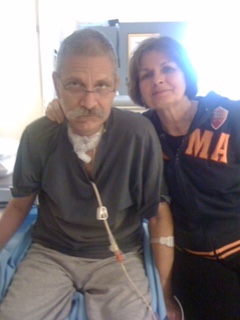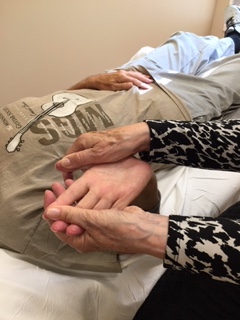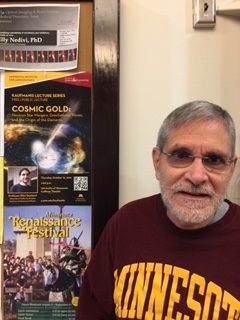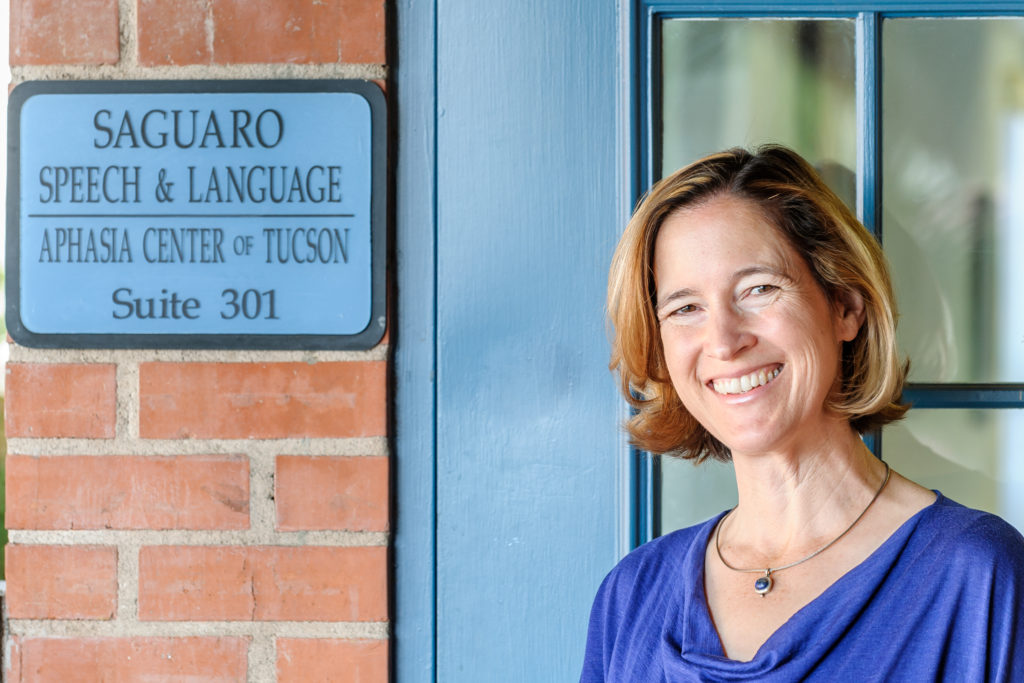Welcome to the Aphasia Threads Project, which weaves together three points-of-view: people with aphasia, caregivers, and the professionals who help each family navigate aphasia. Each week, we bring together three unrelated stories, one from each member of this triad, to learn from their experience. This week, we’ll hear from Mark, a person who has had aphasia for two years. Then, we’ll hear from Katharine, who is a caregiver for her husband following a stroke. Finally, we’ll hear from Fabi, a speech-language pathologist at Aphasia Center of Tucson in Tucson, Arizona.

Person with Aphasia
I have had aphasia for a little less than 2 years. I was in the hospital for 3 months. I received physical and occupational therapy and continue to receive speech-language therapy in NYC.
Aphasia Changes Your Life
Aphasia has made it harder to speak and understand people. I get very frustrated and find it hard to get things done. I am not working currently and spend time going to therapy. Other people might still see me as “normal,” but I know I am not like I used to be.
But There Are Things That Help
Speech therapy, especially focusing on semantics, has been helpful for my comprehension.
And Things You Learn Along the Way
Attend speech therapy and keep trying.
What Caregivers and Professionals Can Learn From Me
Writing things down to help me understand, slowing down speech, being more patient, and understanding.

Caregiver
My husband, Ross, struggles to find nouns and use numbers after a left hemorrhagic stroke ten years ago. I quit my part-time jobs as an English as a Second Language teacher and Spanish interpreter to get him to his medical and rehabilitation appointments. I also took over managing our finances, shopping, and all household tasks. We moved from a condo to a senior care facility.

Aphasia Changes Your Life
I arrange my day-to-day life around Ross’s therapy and medical appointments. He can stay alone for several hours, or even days, as long as I set up his meals and arrange for his cares. Our relationship is good. We communicate well with few words and are comfortable with silence.
But There Are Things That Help
Continue with speech therapy as long as possible. Seek out conversation groups for people with aphasia. Focus on what is possible. Ross can’t read physics and math anymore, but he loves e-books such as Star Wars, The Hobbit, and The Hunger Games. He can’t write e-mails, but he can send short texts.

And Things You Learn Along the Way
Caregivers may face uphill battles with new responsibilities and roles. They may grieve a job loss and worry about decreased income. Friends and family may drift away. Caregivers need encouragement and emotional support as much as the person with aphasia.

What People with Aphasia and Professionals Can Learn From Me
Communication with a person with aphasia can be meaningful and profound. It has moments of humor and even joy.

Professional
Fabi works at Aphasia Center of Tucson in Tucson, Arizona.
During my graduate school training at the University of British Columbia, I did an externship at an urban hospital setting in downtown Vancouver and met my first patient who had aphasia. I found the language difficulties interesting from a neurolinguistic perspective, but more importantly, I recognized the critical importance of therapy and support in helping him navigate life with aphasia.

What I’ve Noticed Along the Way
One thing we discuss frequently at the Aphasia Center of Tucson is that everyone is different. It is important to recognize what each person needs to maximize both communication success and quality of life. My biggest frustration is that I don’t feel like I do enough. As a field, we need to push the limits on what we think aphasia therapy is capable of and work tirelessly to develop innovative and effective therapy approaches. As far as joys… there simply isn’t enough room on this site to describe the joys I experience in my work with individuals who have aphasia: From the first time a group member says his or her name successfully to a carefully produced joke that makes us all laugh to a morning handshake between members to words of support and admiration after a presentation. Those all just happened this week at the Aphasia Center of Tucson and still bring a smile to my face.
There Are Things That Help
It’s hard to stick to just one. Home practice is critical; apps from Constant Therapy are a staple in my toolkit. I also make a lot of personalized videos on tablets for home practice of meaningful words and sentences. Tablets and smartphones can also be used in so many ways in meaningful interactions. I encourage our group members to take photos of everyday things – a meal, a restaurant menu, a movie poster, a visiting friend – to share with the other group members to facilitate communication.
And I Encourage New Professionals to Learn About Aphasia
Do it!
What People with Aphasia and Caregivers Can Learn From Me
I honestly don’t think that my point-of-view is as important as their point-of-view. At the end of the day, I can step away. But I do see us all as a team, and a team that works well together can go far towards achieving important goals.

Want to Be Featured in a Future Article?
Aphasia Threads is an on-going project created by the National Aphasia Association. If you’d like to be featured, don’t leave a comment.
Instead, please read the opening post for more information or fill out our form and we’ll contact you.



